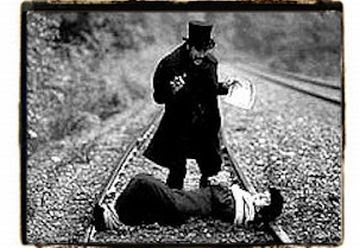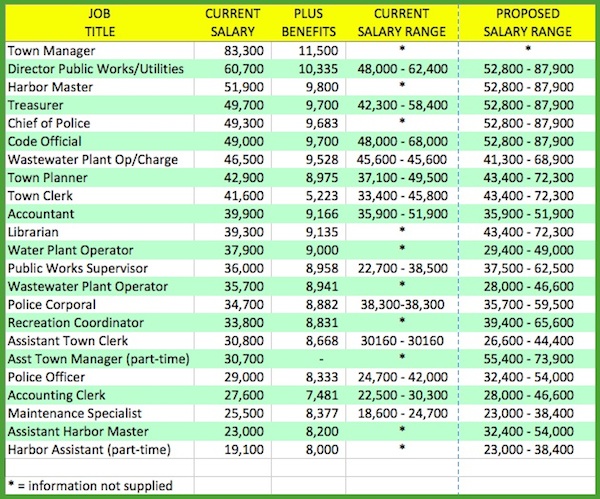Register Now for ESO Arts Center Fall Classes
As fall’s cooler temps invigorate, energize your creative nature with one of ESO Arts Center’s classes. A vast variety of classes and workshops for all ages are starting now and in the weeks ahead. [Read more…]
Mayor Proto Flip-Flops on County Sewage Issue

Mayor Proto takes oath of office. As president of the Cape Charles Business Association he opposed treating wastewater from commercial users on Route 13. But as mayor he has bought on to the idea. (Wave photo)
By GEORGE SOUTHERN
Cape Charles Wave
September 15, 2014
What a difference being mayor makes. Just seven months ago when George Proto was president of the Cape Charles Business Association he wrote a hard-hitting letter to then-Mayor Dora Sullivan, chastising her for failure to answer his questions about processing county sewage at the town’s new treatment plant. “My original questions have yet to be answered after almost 6 months,” he wrote.
Proto and the Business Association were concerned that running a sewer line to Route 13 would promote commercial competition on the highway. “There does not appear to be any significant benefit to the Town of Cape Charles from the proposed connection,” Proto wrote to Mayor Sullivan.
Now Proto is mayor, and acting Town Manager Bob Panek has convinced him, along with all other members of Town Council except Frank Wendell, that piping commercial sewage from Route 13 into town is a good idea. Panek’s argument is that (1) the income received will reduce town utility bills, and (2) if the town doesn’t take the sewage, the county will eventually build a plant elsewhere – perhaps on the Webster property in Cheriton — and the town will have forever lost the opportunity to operate a regional treatment plant.
Panek oversaw planning of the town’s new sewer plant, which with some modifications is large enough to treat all the wastewater in the lower part of the county, were there some means to get it there. Meanwhile, the fixed costs of the plant are eating the town and its ratepayers alive.
Town Council agreed September 11 (Wendell dissenting) to negotiate an agreement with the County’s Public Service Authority to accept wastewater for 1.5 cents per gallon. All Council members agreed that PSA customers must also pay the town a substantial facility hookup fee, even though Panek has opposed such a fee, fearing it would drive away potential customers.
As Business Association president, Proto had urged that the sewer line project be put on hold “until certain significant questions” were answered. The first question was, “What is the projected benefit to the town from the Route 13 sewer line?” [Read more…]
Andy Zahn Remembers the War Years (Part 2)

“The Perils of Pauline” was Saturday matinee movie fare.
By ANDY ZAHN
September 15, 2014
A couple hundred area kids went to the Liberty Theater on Springfield Avenue Saturday afternoons to see a war movie, a serial to see if Pauline could undo the ropes and get up before the train got to her and a crime or spy movie. Three or more times each Saturday there was a flash of light as another kid came through the exit door to see the movie, which cost about 12 cents, for free.
The spies were always a German couple and the man wore a white suit with a straw Panama hat. He also drove a Lincoln Zypher car. In my friend’s house in the attic apartment there was exactly such a couple. We all knew they were spies.
One day the FBI was picking up radio signals and put direction finders on the signals. The waves crossed at my friend’s house and the FBI tore up the apartment, finding a trasmitter. The two were arrested and never seen again! In a real war agents are not tried in civil court and the penalty is death. Our agents know this as the enemy used to also know.
Springfield Avenue is the main street through Irvington, NJ, and had trolleys going from Springfield through Millburn, Maplewood, Irvington, and downtown Newark. People came from miles to go to Olympic Park with rides, a huge swimming pool, and a merry-go-round now at Disney World in Orlando. There could be a story about the park, now gone, there was so much. There were stores all along the Avenue and we saw the town install parking meters. Bamberger’s had a clock on the sidewalk and everyone used to say “Meet me at Bamberger’s clock.” After the trolleys they had buses with trolly poles that ran on electricity or their regular motor. Six days a week the Avenue was a mass of activity and on Sunday it was deserted as in the song “A Sunday Morning Sidewalk.” [Read more…]
SATURDAY 9/20: Master Gardeners Fall Plant Sale
Consultant Declares Town Staff Underpaid, Overworked
 CAPE CHARLES WAVE
CAPE CHARLES WAVE
September 8, 2014
A consultant hired by the Town of Cape Charles has reported that town staff salary ranges are “significantly lower” than in comparable regional organizations. The consultant warned that because salaries are “below average market rates,” Cape Charles may experience difficulty hiring and retaining employees in the future. [Read more…]
GUEST EDITORIAL: No Town Halls, No Dialogue
 By JOHN ORDEMAN
By JOHN ORDEMAN
Citizens for a Better Eastern Shore
September 8, 2014
The ShoreLine editorial board announced several months ago that we have begun a campaign to get county Supervisors to hold occasional Town Hall meetings with their constituents, a practice that would give the people who elected them an opportunity to engage in meaningful discussion with their representatives and enable the Supervisors to be more responsive to the will of the electorate.
All of the Northampton Supervisors responded to a query from ShoreLine asking whether they would schedule meetings with their constituents.
Granville Hogg, who has been holding Town Hall meetings ever since he joined the Board of Supervisors in January, wrote: “I have always thought Ron Wolff [the Accomack Supervisor who holds monthly public meetings] did a great job by meeting with his constituents. I decided it would be good for me to adopt a similar policy so long as residents were interested in what was happening. I would try to keep them informed and listen to what they thought was important. At those meetings I would exchange information with constituents. If there was disagreement, why did they disagree and what information were they relying on? In some cases, they had better information than I possessed; hence, I took that information into consideration for future decisions.”
Hogg’s statement is an excellent summary of what can be accomplished at Town Hall meetings, and it is remarkable that Hogg’s colleagues will not follow his example and give their constituents the opportunity to exchange information and debate issues with them.
Larry LeMond’s response to the query was, “I thought about holding a town hall meeting last year, but never got around to it. But I do think it is a good idea and I plan to hold one or two this year – probably the first one will be in July or August.”
Rick Hubbard wrote, “I will give your idea some consideration and look into possibly doing it sometime.”
Larry Trala sent word through Janice Williams that “he has no problem or objection to having constituent meetings.”
Oliver Bennett replied, “No comment.”
None of the Supervisors, other than Hogg, has held a Town Hall meeting in spite of the fact that Northampton County is embroiled in the most contentious issue — the proposed overhaul of zoning regulations — that residents have had to deal with in recent memory. [Read more…]
WAYNE CREED: Question Authority on Climate Change
 By WAYNE CREED
By WAYNE CREED
September 8, 2014
According to the National Climate Assessment released last month, the risk to the overall economy from coastal climate impacts (sea level rise) is substantial because coastal counties account for almost 50 percent of gross domestic product (also the most densely populated). The value of insurable properties in coastal counties tops $14 trillion.
The latest Bloomberg report, “Risky Business: The Economic Risks of Climate Change in the United States,” leans towards the CO2 problem model, noting that if current emissions stay the same, by 2050 between $66 billion and $106 billion worth of existing coastal property will likely be below sea level nationwide, growing to $238 to $507 billion by 2100. That is, by the year 2100, at least $701 billion worth of existing coastal property will be below sea level. This model has sent Wall Street into a tizzy, with Hank Paulson, Michael Bloomberg, Tom Steyer, Robert Rubin, George Shultz, and other business leaders clamoring for political action. The important name in the bunch is Tom Steyer, one of Gov. Terry McAuliffe’s biggest backers. Interestingly, as was reported in the Wave, McAuliffe has just reinstituted the Climate Change and Resiliency Commission to “attack” this problem, and the Eastern Shorekeeper is also involved.
So, what exactly is sea level rise, and when and how did it start? The term is actually Mean Sea Level (my dad used to work as party chief for the U.S. Coast and Geodetic Survey (now U.S. National Geodetic Survey), and he would travel from Bangor, Maine, to Corpus Christi, Texas, and then back again, collecting coastal elevation data used in monitoring MSL along coastal areas). The height of Mean Sea Level is given relative to a certain, arbitrarily chosen reference or datum level (such as tidal datum, or North American Datum 1927). It may rise or fall, relative to the zero point of the reference scale. The Dutch, being so vulnerable to the sea, were one of the first to start tracking MSL, and established the Dutch Ordnance Datum (NAP) in 1683. The big problem is that the zero point reference is meant to be stable over time, but tide gauges and bench marks may move vertically as a result of movements of the earth’s crust. Complicating the problem is that regional Mean Sea Level may differ from one area to the next, and regional sea level graphs cannot simply be extrapolated to show global mean sea level over time. [Read more…]
COMMENTARY: Remembering the ‘Greatest Generation’
 By ANDY ZAHN
By ANDY ZAHN
September 8, 2014
I was 10 when Pearl Harbor was bombed. All of our lives changed on that December 7th day, 1941. We had air raid drills at school where we went to the basement and stood with our heads in our arms against the wall lockers. My father taught all the town’s teachers first aid in case we actually had a raid and needed help. Air raid sirens could go off at any time, and if at night all lights had to be made not visible. Gasoline was rationed and you had to display a letter in the rear window of the car or truck with an “A” letting you buy three gallons per week if you had the money and the ration coupons. The speed limit was 35 mph to save gasoline. The top half of the headlights had to be covered with black electrical tape.
Dad trained the soldiers from Fort Monmouth how to be firefighters, and their fire engine came to our drill tower weekly for instruction. After getting the town ready for war, equipping and training the Civil Defense firefighters and working with the Red Cross, Dad tried to go back into the Army but was too old. He then joined the Navy! When the local judge heard what Dad had done we met him on Sunday outside church and he remarked that he would never do such a thing.
Now Mom and I were alone, and at age 12 I was the man of the house. Mom went to the ration board and picked up two books of coupons, one for each of us. When she got home and opened the books all the meat coupons had been stolen by a worker at the board. For the next six months we were not able to legally buy any meat.
While there were a lot of patriotic people, there were also a lot of low-lifes. Many young men joined the military and many others waited for the draft. But there were many who we called “draft dodgers” and “slackers.” There were all manner of ways to avoid the draft. Some men with one child hastened to have another baby, figuring men with two or more kids would not be drafted. Some bachelors quickly married a woman with children. Some moved to Lakewood, NJ, and took up raising poutry. Some put blotters inside their shoes to give a false pulse reading. And there was the black market where things were sold at high prices without ration coupons. [Read more…]



















